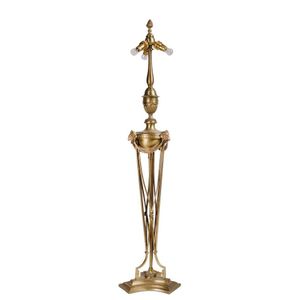Classical Figural Candelabra Pair
You must be a subscriber, and be logged in to view price and dealer details.
Subscribe Now to view actual auction price for this item
When you subscribe, you have the option of setting the currency in which to display prices to $Au, $US, $NZ or Stg.
- Ormolu - Ormolu was popular with French craftsmen in the 18th and 19th century for ornamental fittings for furniture, clocks and other decorative items. True ormolu is gilt bronze, that is bronze that has been coated with gold using a mercury amalgam. Due to the health risks associated with using mercury, this method of creating ormolu was discontinued in France in the 1830s. A substitute was developed consisting of about 75% copper and 25% zinc, however it was inferior to the bronze version. It was often lacquered to prevent it tarnishing.
- Acanthus - A stylized leaf motif, one of the primary decorative elements of classical Greek and Roman architecture, derived from the genus of flowering plants in the family Acanthaceae, native to tropical and subtropical regions of the Mediterranean area. It is a common element in classical Greek and Roman design, and is often seen in Corinthian and Composite order columns and used as a decorative element in English, European and Australian furniture, particularly on the curve of a leg, and as decoration for a corbel.
This item has been included into following indexes:
- candelabra / candelabrum
- torcheres 115
Visually similar items

A brass standard lamp with cast lion mask and swag decoration, 102 cm high

A large and impressive pair of bronze and gilt bronze figural candelabra, French, 19th century, each on a stepped rouge marble base, 138 cm high

A pair of gilt bronze figural candelabra, French, 19th century, each of an Eastern figure holding aloft a acanthus branch, 41 cm high

A French Empire gilt bronze figure of a classical draped maiden signed Pierre Philippe Thomire (1751-1843), 71 cm high
